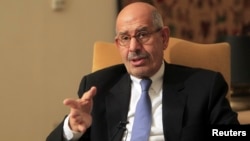CAIRO —
Egypt's top opposition leader Mohamed ElBaradei is calling Saturday for a boycott of the country's upcoming parliamentary elections. A spokesman for the opposition National Salvation Front says the group, as a whole, will decide on its position in the next couple of days.
ElBaradei, who is the symbolic head of the opposition National Salvation Front, called for the boycott on his Twitter account, saying that he was not willing to be part of a “sham democracy.”
He called the upcoming parliamentary elections “an act of deception,” and reminded his supporters that he had also urged a boycott of the 2010 parliamentary elections under former President Hosni Mubarak.
Mubarak's ruling National Party won most of the seats in that vote which was tainted by widespread fraud.
The main opposition spokesman, Khaled Dawoud, indicated that the 11 party National Salvation Front would meet on Monday or Tuesday to make a final decision on what position to take.
He noted that the parties were worried that the Islamist government of President Mohamed Morsi would commit the same sorts of electoral fraud as Mubarak did. He insisted that the opposition would like guarantees from Mr. Morsi that that would not happen:
He asks how can elections be held in Port Said, for example, if that city is still in the midst of a (an ongoing) civil disobedience campaign and how can there be a four-stage electoral process if there is some doubt that the judiciary will oversee the elections?
President Morsi issued a decree late Thursday, stating that the parliamentary election would be held in four stages, beginning on April 27. Various opposition groups are complaining that stages of the vote were deliberately scheduled for Palm Sunday and Easter, according to the Coptic orthodox calendar.
Omar Ashour, who teaches political science at the University of Exeter in Britain, insists that those elections held since the overthrow of Mr. Mubarak have been clean elections and that he believes the upcoming vote will be as well:
“Probably the [opposition which] has consistently lost in the last four elections wants to spoil the game," he said. "They don't see a way to power via elections, so their only way is either to boycott or to undermine the whole electoral process.”
Ashour argues that the Egyptian judiciary, which he says is “not friends with the Muslim Brotherhood,” and international monitors will oversee the parliamentary elections, indicating that the vote will in fact be fair.
A large segment of Egypt's judiciary, however, boycotted the December constitutional referendum, which opposition figures claimed was unfair. The opposition is also demanding that Egypt's new top prosecutor be removed, for alleged sympathies with the Islamist government and that a neutral national unity government be appointed to oversee the vote in April.
ElBaradei, who is the symbolic head of the opposition National Salvation Front, called for the boycott on his Twitter account, saying that he was not willing to be part of a “sham democracy.”
He called the upcoming parliamentary elections “an act of deception,” and reminded his supporters that he had also urged a boycott of the 2010 parliamentary elections under former President Hosni Mubarak.
Mubarak's ruling National Party won most of the seats in that vote which was tainted by widespread fraud.
The main opposition spokesman, Khaled Dawoud, indicated that the 11 party National Salvation Front would meet on Monday or Tuesday to make a final decision on what position to take.
He noted that the parties were worried that the Islamist government of President Mohamed Morsi would commit the same sorts of electoral fraud as Mubarak did. He insisted that the opposition would like guarantees from Mr. Morsi that that would not happen:
He asks how can elections be held in Port Said, for example, if that city is still in the midst of a (an ongoing) civil disobedience campaign and how can there be a four-stage electoral process if there is some doubt that the judiciary will oversee the elections?
President Morsi issued a decree late Thursday, stating that the parliamentary election would be held in four stages, beginning on April 27. Various opposition groups are complaining that stages of the vote were deliberately scheduled for Palm Sunday and Easter, according to the Coptic orthodox calendar.
Omar Ashour, who teaches political science at the University of Exeter in Britain, insists that those elections held since the overthrow of Mr. Mubarak have been clean elections and that he believes the upcoming vote will be as well:
“Probably the [opposition which] has consistently lost in the last four elections wants to spoil the game," he said. "They don't see a way to power via elections, so their only way is either to boycott or to undermine the whole electoral process.”
Ashour argues that the Egyptian judiciary, which he says is “not friends with the Muslim Brotherhood,” and international monitors will oversee the parliamentary elections, indicating that the vote will in fact be fair.
A large segment of Egypt's judiciary, however, boycotted the December constitutional referendum, which opposition figures claimed was unfair. The opposition is also demanding that Egypt's new top prosecutor be removed, for alleged sympathies with the Islamist government and that a neutral national unity government be appointed to oversee the vote in April.








